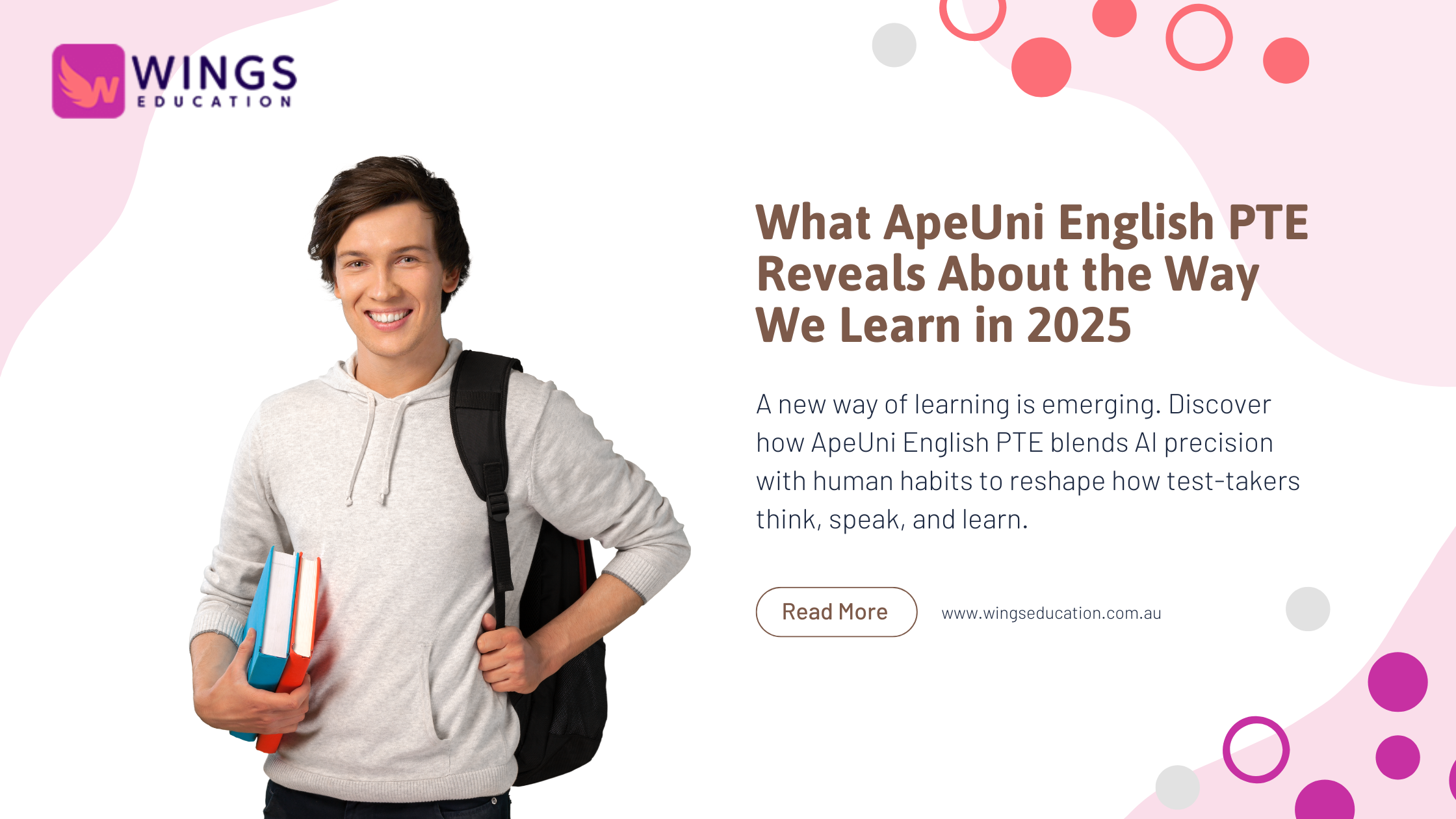
When Practice Talks Back: What ApeUni English PTE Reveals About the Way We Learn in 2025
A new way of learning is emerging. Discover how ApeUni English PTE blends AI precision with human habits to reshape how test-takers think, speak, and learn.
It’s no longer just about repeating sentences or describing images — it’s about recognizing patterns in your own communication. When learners use ApeUni English PTE, they start to see how much of language learning self-observation is. You begin to notice why you pause, how you think, and what makes your fluency stumble. The app doesn’t just grade your words; it grades your awareness. Each feedback line, whether positive or critical, becomes a quiet nudge toward reflection. You start asking deeper questions: Did I sound natural or rehearsed? Was my pronunciation clear or just loud? It’s a subtle but powerful transition — from practicing to thinking about how you practice. And that’s where the real progress happens. Language fluency doesn’t grow from repetition alone; it grows from noticing your own patterns and reprogramming them consciously. ApeUni English PTE becomes less of a test simulator and more of a thinking space — a digital mirror that exposes the small habits shaping your English personality. In 2025, this shift defines modern learning. The smartest learners aren’t those with perfect grammar, but those who’ve learned how to learn — and that are exactly what this quiet, AI-driven revolution is teaching us.
The Mirror Effect
Every score, waveform, and pause tells a story you didn’t know you were writing. ApeUni English PTE acts like a mirror held up to your thoughts — showing you not just what you said, but how you said it. Maybe you sound confident until the question shifts slightly. Maybe you rely on filler words when you’re unsure. The app captures these subtle cues, helping you see the invisible connection between thought and expression.
And that’s where growth begins — in awareness. You start noticing that real fluency isn’t about speaking faster; it’s about thinking clearer. The rhythm of your speech, the placement of pauses, even the tone you choose — all reveal your comfort with the language. What makes ApeUni English PTE unique isn’t just accuracy; it’s that it helps you understand your own communication DNA, one mistake, one realization, one quiet improvement at a time.
From Study to Self-Study
That’s the hidden lesson behind every practice session — discipline disguised as language learning. When your classroom lives inside your phone, excuses shrink. You can’t blame traffic, missed lectures, or inconvenient schedules. The only barrier left is your willingness to open the app and start. And that’s where many learners discover the truth: progress isn’t made in giant leaps but in quiet, consistent steps.
Every short session, every 10-minute mock test, becomes a small act of accountability. It’s less about mastering English overnight and more about forming a ritual of showing up — even when you don’t feel ready. ApeUni English PTE doesn’t reward intelligence as much as it rewards persistence. Over time, this routine shapes more than language skills; it reshapes mindset. You begin to understand that success in English, and maybe in everything else, is not about knowing more — it’s about returning, retrying, refining. The app’s reminders stop feeling like guilt trips and start feeling like gentle nudges from a version of you that refuses to quit. That’s not just test preparation anymore; that’s habit transformation — the art of becoming consistent in an inconsistent world.
When AI Sounds Like a Teacher
It’s a strange paradox — you’re being judged by a machine on how “human” you sound. The ApeUni English PTE experience highlights this tension perfectly. You can be articulate yet miss a point for speaking too softly, or lose marks for a natural pause that felt authentic. It’s not unfair — it’s just different. The algorithm listens for order, not emotion. But here’s where growth happens. You start learning that being understood isn’t just about personality; it’s about structure. True communication lies in the balance between feeling and form. The test teaches you to organize your thoughts without losing your voice. So instead of trying to sound perfect, you learn to sound clear — naturally, confidently, and intentionally. That’s the real win: not beating the system, but mastering the rhythm of language in a way that bridges both technology and humanity.
Micro-Learning and Macro Patience
That’s the quiet science of habit — consistency reshapes cognition. Every short session wires your brain to respond faster, process smoother, and recall patterns effortlessly. With ApeUni English PTE, it’s not about studying harder; it’s about studying smarter. When you practice regularly, your mind stops treating English as a subject and starts treating it as instinct. The transformation is subtle — you begin to think in English instead of translating. Those daily 30-minute routines also train your focus. Instead of exhausting yourself in long sessions, you give your brain time to rest, absorb, and refine. Each practice builds on the last like layers of understanding. It’s repetition without burnout — rhythm without pressure. Over time, fluency becomes less of a goal and more of a habit. You’re not memorizing anymore; you’re evolving. That’s the hidden strength of short, focused effort — quiet, sustainable progress that grows almost invisibly until one day, everything simply clicks.
The Sound of Thinking
And that’s what makes the process deeply transformative — it’s not just language practice; it’s mental conditioning. Every time you speak into the mic, you’re exercising judgment, timing, and awareness. You begin to sense rhythm, measure silence, and manage anxiety in real-time. The ApeUni English PTE experience becomes a rehearsal for real-life communication — where words matter, but timing matters more.
This constant decision-making builds what psychologists call cognitive agility — the ability to think, adapt, and respond without hesitation. Over time, you stop second-guessing and start trusting your instincts. You don’t just sound fluent; you become fluent. Whether it’s responding to a patient, attending an interview, or delivering a presentation, this micro-skill of clear thinking under pressure becomes invaluable.
So while you may log in to practice speaking, what you’re really developing is mental fluency — the seamless connection between thought and expression that defines true communicators in both language and life.
Beyond Grammar and Fluency
Real fluency isn’t about speed; it’s about connection — the ability to make others understand you without confusion or effort. In the world of ApeUni English PTE, this becomes clear very quickly. You realize that scoring high isn’t the same as sounding human. You can have perfect grammar and still fail to engage, or speak quickly yet miss the heart of communication — clarity and emotion. Through repetition and feedback, learners start to sense the gap between knowing English and living it. You begin to slow down, choose simpler words, and speak with intention rather than precision. That’s not just progress — that’s evolution. Because communication isn’t a technical act; it’s an emotional one. What ApeUni English PTE really teaches, without saying it aloud, is that authenticity and empathy carry as much weight as accuracy. In every test response, it reminds you that English isn’t just about passing — it’s about being heard, understood, and trusted.
Learning in Public
What’s beautiful about this digital community is how it transforms competition into connection. On platforms built around ApeUni English PTE, learners from every corner of the world gather — nurses from India, engineers from the Philippines, students from Nigeria — all chasing the same dream of clarity and confidence. Yet, what binds them isn’t just the pursuit of a high score; it’s the shared struggle of self-improvement. People exchange recordings, correct each other’s pronunciations, and celebrate even a 2-point score improvement as if it were a championship. It’s collective growth disguised as casual conversation. Behind every post lies courage — the willingness to be imperfect in public. This open culture of feedback creates something no classroom ever could — a sense of belonging. Learners aren’t just practicing English; they’re finding a voice in a global dialogue. And somewhere between scores and suggestions, they discover that fluency isn’t just about speaking English — it’s about being seen and understood as themselves.
The Psychology of Progress
The human brain learns in whispers, not shouts. Progress in ApeUni English PTE doesn’t announce itself; it hides in repetition, in those moments when you think you’re stuck. You might repeat the same speaking task for days, wondering if anything’s changing — and then one day, your fluency graph spikes, your words flow, and everything suddenly clicks. That’s not coincidence; that’s your brain quietly rewiring through consistency. This invisible progress teaches patience — a skill far more valuable than memorizing templates. It reminds you that learning isn’t linear; it’s layered. Each session, each retry, builds unseen confidence beneath your conscious awareness. When the score finally rises, it’s just evidence of what was already growing within. So, the next time you feel stagnant, remember: the silence between effort and reward is where mastery blooms. The ApeUni English PTE app might measure progress digitally, but your real development happens mentally — in resilience, focus, and the quiet faith to keep going.
The Hidden Pressure of Precision
There’s a quiet ache in watching your dreams hinge on decimals — a 0.2 here, a 1.5 there. Numbers that look small on paper but feel massive in real life. ApeUni English PTE learners often talk about this emotional weight — the way a score can decide a timeline, a visa, or a career. Yet within that stress lies a deeper education: learning how to stand back up. Every near miss teaches endurance. You stop seeing failure as final and start treating it as feedback. You realize that improvement isn’t a miracle; it’s momentum — built through retries, revisions, and resilience. That emotional vocabulary — patience, composure, grit — is rarely taught in language classes, yet it’s what defines real communicators. Because beyond the marks and metrics, success in English is also about how you recover from setbacks. That’s the unspoken lesson of test prep — the art of staying steady, even when the decimals feel heavier than words.
Why the Human Still Wins
And that’s where the true balance of learning lies — between algorithms and empathy. ApeUni English PTE gives structure, rhythm, and objectivity, but human guidance brings meaning. A mentor knows when you’re not just making a grammatical error but losing confidence. A teacher can hear hesitation that no software can quantify. Those emotional understanding shapes not just how you speak, but how you believe in your voice. The smartest learners don’t choose sides; they combine strengths. They use AI for precision — for data-driven awareness — and humans for depth, for the emotional push that keeps them consistent. Because in reality, the test doesn’t just measure skill; it measures composure, adaptability, and heart. Language, at its core, isn’t binary. It’s messy, alive, human. And while technology like ApeUni English PTE can help refine how we sound, it’s the people — teachers, peers, and our own persistence — that refine who we become when we finally speak.
The Future of Learning Looks Like You
This new era of learning isn’t about repetition — it’s about reflection. ApeUni English PTE represents that evolution beautifully. It shows how education has shifted from obedience to awareness, from “follow this format” to “understand your pattern.” Learners today aren’t just consuming content; they’re observing themselves in the process. Every practice session becomes a quiet study of focus, patience, and emotional control.
And that’s what makes modern test preparation so fascinating — it’s not simply linguistic training; it’s mental discipline. You’re learning to think clearly under pressure, to trust your instincts even when the clock is ticking. You begin to realize that mastering English isn’t just about words; it’s about mindset.
In that way, ApeUni English PTE symbolizes the future of education — one where technology doesn’t distance us from our humanity but deepens it. The best learners of 2025 aren’t robotic perfectionists; they’re mindful communicators who’ve learned that clarity, empathy, and calm are the new forms of intelligence.
Final Thought
Preparing for the PTE today is less about outsmarting technology and more about aligning with it. You’re not trying to trick the algorithm — you’re trying to train your mind to express meaning with precision. Every prompt, every mock test, is a small test of patience, focus, and presence. Tools like ApeUni English PTE don’t just evaluate pronunciation or fluency — they reveal how you handle structure, pressure, and expectation.
And somewhere between the practice sessions and reattempts, you begin to notice subtle shifts. You start pausing with intention. You listen more actively. You speak not just to score, but to be understood. That’s where the transformation really happens.
Because at its core, language is an act of empathy — a bridge between thoughts and understanding. No AI can replicate that human connection. So, while the test measures your words, your growth lies in something deeper — learning to communicate with awareness, confidence, and compassion. That’s the real success of modern English learners.























